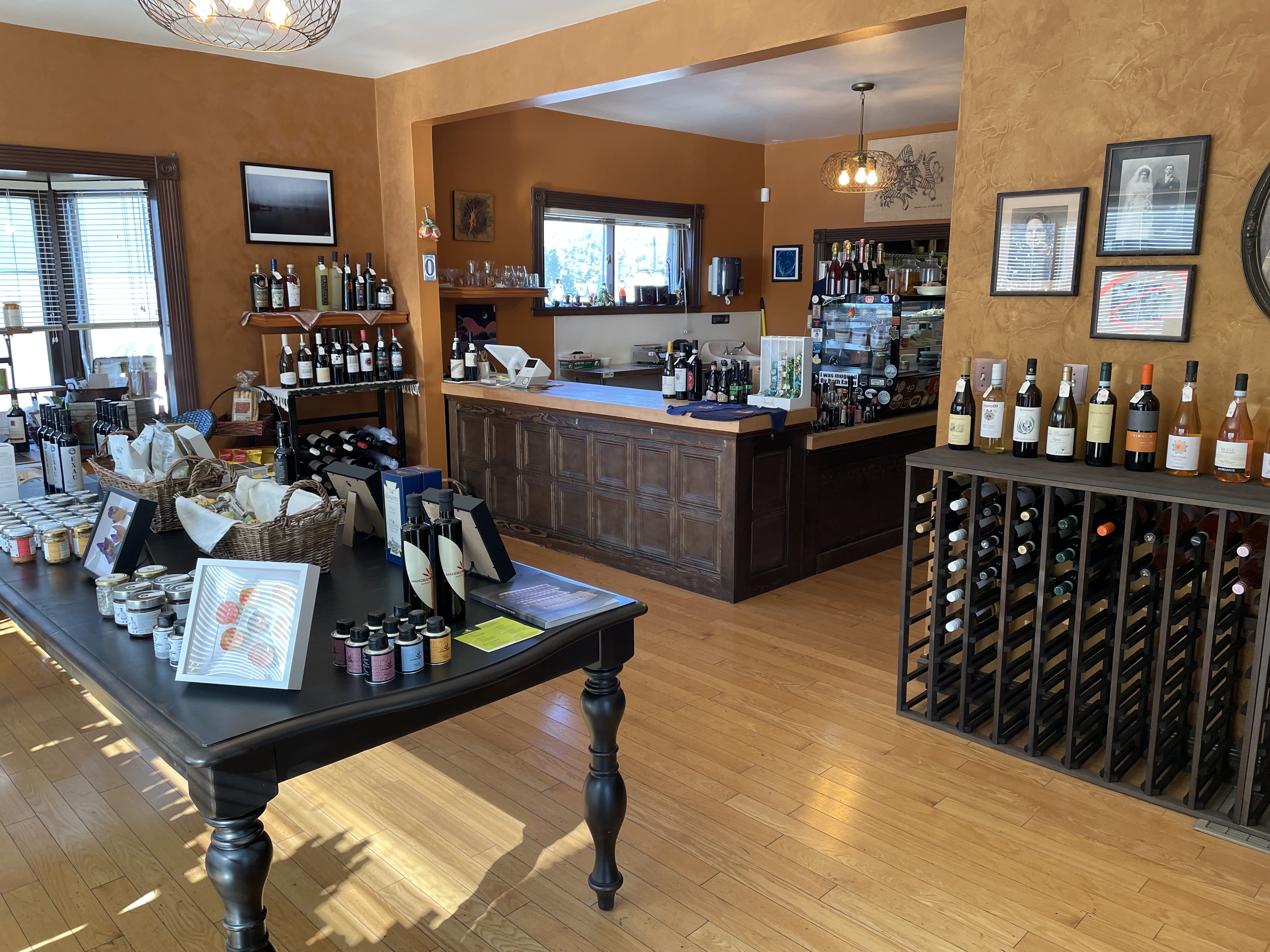Opened in 1996 by the late Giovanni and Carolina Scordato, Scordato Bakery is one of the few Milwaukee bakeries serving specialties like Sicilian cookies, cannoli, bread, and sfinciuni.
But it wasn't always that way.
"When we first opened the bakery, there were so many Italian bakeries," says Scordato Bakery Vice President Antonella Scordato-Lorenz. "Now, there are hardly any left. It is hard work, and it's not easy. So, I'm not surprised that there are not a ton of traditional bakeries left in Milwaukee, but we are proud that we're one of them."
I recently had the opportunity to chat with Antonella and her brother, Alessandro Scordato, who serves as the bakery's president. The siblings shared their background, what goes into a typical day at Scordato, their favorite menu items, ways they ensure authenticity, advice for those interested in running a bakery, and more.
Your family is from Sicily. Tell us how Scordato got its start in Milwaukee.
Alessandro: Our parents married in Bagheria. Our dad came first in his early twenties. He started working at his uncle's bakery, Peter Sciortino Bakery. Our mom came a few years later, and they were here until 1980. We moved back to Italy for a few years, between 1985 and 1987. But they decided to move back to Milwaukee, and our dad and his friend decided to open up their own bakery called Roma Bakery in the Bay View neighborhood.
They had that for a few years. Then, our dad sold his partnership to his partner, Sal, and decided to open his own place with our mom in 1996. That's how we ended up with Scordato Bakery at our current location. We've been there ever since.
Antonella Scordato-Lorenz and Alessandro Scordato
What kind of influence did your Sicilian upbringing have on you?
Antonella: I think it was just more about our parents' work ethic than anything. I guess it's just making sure we're keeping the tradition alive and keeping the roots of the types of things that we grew up with, the pastries, food, and things like that.
Tell us about your experience taking over the bakery in 2019.
Antonella: Our mom passed away in 2000, and then it was the three of us, my brother and I, with our dad. My brother's son, Giovanni, came to work at the bakery when he was old enough, and later, our stepmom, Irina, joined us. Our dad kind of retired even though he was there almost every day.
It was hard to keep him at home. He worked his whole life and enjoyed what he did, speaking to customers and having a presence in the store. And he lived just a few blocks away, so he was never the type to just stay at home and watch TV. He was always hands-on.
Alessandro: Before our dad actually got sick, his body was starting to age, telling him, "No," but he still wanted to be there. So he would come in, not work as much as he did before, but he was around. But my sister and I took over.
We worked there pretty much our whole lives, and I did some other work when I was a teenager, but I always helped out in the store, so I got used to the hours and the work and everything little by little. Over time, it was just part of both of our lives, so it wasn't that difficult.
Our dad was always there to point us in the right direction if need be. So, once he was gone, I think our main focus was always to maintain the work ethic he instilled in us, keep quality a top priority, and just keep the legacy going. And it felt good to be able to do that and keep going in that direction.
Antonella: After he passed in 2019, it was almost like it lit a fire under us. I remember that for years, our dad always talked about how we should remodel the store and make improvements to the business. And we're just like, "Yeah, that's a good idea."
Then, after he passed, both of us decided we were going to remodel the store. We're going to not reinvent things because we wanted to keep everything the same, but it was really nice just to kind of execute that vision that he had of redoing the store and making it look so much nicer. And it actually really helped grow our business even more, which was crazy how much just remodeling the store would've made a difference. But we've just been busy and steady ever since with just our regular customers.
Alessandro: We have a really good customer base. They're really loyal, and they've always supported us year after year, so they've been a big part of our success.
What's a typical day at Scordato Bakery?
Alessandro: I start around one or two in the morning and do all the bread and roll orders for the store and delivery.
Antonella: We have the wholesale accounts that we bake for and different restaurants in the area, and then we have to make bread and rolls for the store, of course.
Alessandro: After that, I just start on whatever cookies we need to make for that day and other items like banana bread or pizza crust or calzone, stuff like that. So I get done around 11. Then, my sister works in the afternoon, and she closes and takes care of any cakes or other pastries.
Antonella: We do a lot of weddings, especially in the summer and September into the fall. We do a lot of sweet tables, wedding cakes, and regular cakes. Those are things that I take care of along with the hiring and payroll. We do the inventory, making sure everything is stocked.
We're really lucky. We have really great employees. We're so lucky to have so many of our employees with us for over two decades. We're in a really good community. We're more like a close family.
Alessandro: The work is ongoing; it never stops. You never really get to punch out when you run your own business. So if we're not at the bakery, we're going to Sam's Club or getting inventory or Restaurant Depot. There are always certain things to take care of other than at the bakery. So it keeps us busy.
Antonella: Our busiest time of year is the holidays and then a little bit into January. So we try to close for a week or so sometime in January when we're finally caught up, and things are slowing down so we can give everybody a well-deserved break.
Next year, we'll be closed for two weeks in the summer so we can spend some time with our family in Sicily. It's really hard for either of us to get away unless the bakery's actually closed. It's not like a company where we can just punch out, and I can't relax or even think about enjoying a vacation if the store's open. So it's like we've got to close in order to relax and enjoy ourselves.
Scordato cookies are a holiday favorite.
What are your favorite items on the bakery's menu and why?
Antonella: I still obsess over cookies, especially the more traditional ones like the tutu and the Sicilian rainbow cookies. Our cannoli, especially the chocolate, are always so good.
Alessandro: We'll always have cannoli when we're feeling a little nostalgic or homesick for Sicily.
Antonella: Or the sfinciuni; I still eat that on the regular. We make it every day. We'll just cut it up and put it in the back so everybody can munch on it.
When we're on vacation and closed, I always miss our bread and rolls. You won't be able to find that nice crispy bread that we have. I look forward to coming back, making another batch, and having a nice hot sandwich on bread right out of the oven.
Alessandro: One of my favorites is what our dad used to do: a mini Italian loaf right out of the oven, still hot. You just slice it down the middle. You add some extra virgin olive oil, some Romano cheese, and maybe a little bit of tomato. I eat it right out of the oven, and the texture when you first bite it, with that crispiness on the crust, is just one of a kind.
Tell us more about your sfinciuni.
Antonella: It's a traditional sfinciuni outside of the fact that the one we make for the store doesn't have anchovies. We make it without anchovies because it's not as popular here.
Ours has a traditional thick, spongy crust. It has tomato sauce, oregano, grated Romano cheese, and spices. It's just like a meatless room-temperature pizza.
We do make it with anchovies on order, but we don't typically sell it in the store. Even though it's traditional, it's not as popular that way.
Alessandro: It's a tradition in Sicily. Each family makes its own sauce with caramelized onions. Some people use the traditional primo sale cheese.
Antonella: It's what you put into the dough before you bake it in the oven. Before you put your sauce on, you make the dough, you lay it out, and then you push the primo sale into the dough. We don't make it that way for the store because it's expensive and hard to find here.
Alessandro: We've had to change it up a little bit. But the way that we make it turns out really good, especially with the Romano cheese mixed in with the breadcrumbs and the olive oil on top.
I prefer it the day after in the toaster oven, or I just throw a slice from the day before directly on the oven shelf and crisp it up. It gets this really nice crunchy taste on the outside, but it still has that sponginess on the inside.
We don't use pizza dough; we use bread dough, and that's the only way you can get that really thick spongy size on the crust. If you use regular pizza dough, then you're just going to end up with a thinner, denser crust. So if you want that nice, thick kind of pan style, you use the bread dough.
How do you ensure the authenticity of your Sicilian recipes?
Alessandro: We use simple ingredients in all of our products, especially the cookies and the bread. We don't use preservatives. Our dad always tried to keep the same recipe from Sicily that he grew up with, and our uncle taught him that. "Keep it the same. Don't do anything fancy; just keep it original."
It shows, and it makes a difference in the taste. Quality has always been our number one priority, and we ensure that the process stays the same and that the steps from start to finish remain the same every time we do something. That's helped us stay well-known with all of our customers.
Antonella: Whenever we go to Sicily, we'll bring back ingredients that we need. We get our anise oil, which we use for anise cookies.
We try to make sure we don't ever change anything or compromise just to save a few pennies. There are cheaper ways that we can do things, but that's really not how our dad did it.
Alessandro: One example is the butter. We always emphasize using a hundred percent butter. Some places do a half-and-half, half margarine and half butter. You can taste the oily difference. Things like that compromise the product, and we don't want to go down that route.
Antonella: Even when we make our cannoli cream…. I've seen recipes that are just cheap cream cheese. We use simple ricotta and sugar and chocolate chips. We make everything the way our dad did. We're not trying to save a few pennies.
You're also known for your cakes. Can you share a memorable cake order?
Antonella: One that stands out was one of my very first wedding cakes. We've been making cakes for a long time, but this one was probably one of my favorites. It was one of those ones where when you're done with it, you step back and really admire it.
It's one of our most duplicated cakes; brides will come in, see it, and want that exact same one. It's a three-tiered cake with calla lilies that are cascading down. It's simple. There's not much to it outside of the beautiful calla lilies, but it's just one of those cakes that is just really memorable.
Then there was one other cake that I made… I don't remember the cake at all, but it sticks in my mind because as I was finishing it, the bride showed up. I was still putting it together, and she started crying because she was so happy about it.
I don't remember what the cake looked like at all. I don't even know if I still have a picture of it, but I just felt the emotion of her being so overjoyed.
What advice would you give to someone who wants to start their own bakery or pursue a career in baking?
Antonella: Find a good staff, find good people that you can rely on. We wouldn't be able to do any of the things we do without our staff.
Alessandro: It's kind of a load off knowing that we can rely on them when needed. So that helps out a lot when you can trust your employees to take the next step whenever you need them to.
Antonella: Alessandro's son, Giovanni, who was named after our father, works at the bakery, and he's an incredible help. He is such a hard worker, and he definitely helps with a ton of things: a lot of what our mom showed me how to do, like our lasagna that we make on weekends or different things, like our homemade sauce and meatballs that I used to make.
Now, I spend most of my time just making cakes and pastries, and he's able to pick up that tradition and help me with those types of things, and he's great at it. So, it's great to have him be a part of our bakery and our legacy and help us.
You have to get good employees that you can trust and rely on, and you have to make sure that you're willing to give the best customer service and always put that first. I feel like that's so important. Every time I see another good review, another five-star review on Google, I'm just like, "Well, they were impressed with our customer service." I feel like that's so important nowadays.
Alessandro: It's hard to go into a place and actually talk to the owner or someone that's part of the business. Our dad said, "It's easy to open up a business. It's difficult to keep it successful year after year after year."
It takes a lot of work, dedication, and sacrifice, and you have to focus on these things. Otherwise, you won't be successful.
Antonella: You're always kind of on call if something happens; it kind of never ends. You have got to be willing to part with time and be as dedicated as possible.
What do you hope customers will take away?
Alessandro: I'm hoping that whoever reads this understands that we're a small family business, and we hope that they appreciate all the hard work and the products that we've put out. It's difficult to find local businesses nowadays. We hope to continue the tradition for another 30 years, hopefully, and God willing. We're happy with what we do, and we're hoping to continue the legacy of our parents.
If you enjoyed this article, consider subscribing to my newsletter for more content and updates!




